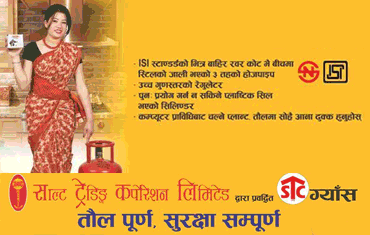Feature News: GBV still exists in its ugly form; high time to hit the root cause
Kathmandu : Prabha Poudel, an MA level student in Gender Studies, Tribhuvan University, strongly believes “biological difference is not and cannot ever be the basis of discriminations against anyone and all humans must be treated equally, despite their sex/gender, race, status, religion, class, caste, geography and so on.
Teachers’ lectures on the topics of gender, theories about its social construction and need of deconstruction of unequal structures based on sex/gender system so as to advance towards an equal society send a wave of empowerment inside her, making her to feel that she must do something for the removal of inequalities existing in the society.
Last time, she took a time to visit her bereaved relatives at the Pashupatinath Kiriyaputri Ghar. The scene of two teenage girls in complete white dress observing the 13th day death rituals of their father made her feel proud as such rituals are still largely supposed to be performed preferably by sons and if not by male members of the family as they are taken as eligible, as per the tradition.
But amidst casual talks with them, she felt a pinch deep inside her heart when she came to know that girls’ grandpa in the village has been performing the rituals of his son separately in a retaliatory move to prove that what his granddaughters were doing was wrong and against their gender roles as such roles are not socially, culturally, religiously and ancestrally prescribed for the daughters.
Though the old man was doing counter acts thinking them as appropriate as a result of internalization of gender roles traditionally prescribed for daughters and sons/ men and women in society, Prabha sees this as an example of gender-based violence (GBV). She is more worried about the impact such move would leave in fresh minds of the girls.
The next day, Prabha joined a rally taken out by her college against the GBV and decided to share the incident with her colleagues gathered to voice against the GBV in the context when the world had just wrapped up the “16 Day of Activism against the Gender Based Violence- 2018” (November 25- December 10).
Prabha’s personal judgment is that we have to go a long way to end GBV as it is deeply imbedded in the society and interventions into the micro level are necessary to dismantle the foundation for GBV.
Just yesterday, the news appeared in Nepali media that a woman was reportedly expelled from home for not bearing a son. The 26–year-old of Ludku of Kanakasundari rural municipality-6, Jumla, was forced to leave her home along with her two daughters when she was excepting a new one.
Now she is struggling at the Karnali Academy of Health Sciences to save her newborn baby born with Hepatitis B infection. She gave birth to a baby girl through a C-section on December 18 and is in the hope of finding generous hearts who could financially assist her to treat her ailing child.
She, just in her mid 20s, is the mother of three daughters and has so far been pregnant for sixth time with one stillbirth who was a baby girl. As she said, in the past she was forced (by her husband) to abort two pregnancies for being female fetus. She believed that her husband and in-laws chased her away from home along with two small kids in November when she was in the eighth month of pregnancy, calculating that this also she was not meeting the family ‘expectation’ of bearing a son.
There are literally none beside her except her aged parents in this tough time. In the Nepalese society which still laments the birth of daughters and celebrates the presence of sons, the sex-selective birth, one of the worst forms of GBV, is going beyond the control in invisible way.
It presents one of the worst examples of gender based violence in Nepal which is a member party to the United Nations Convention on Elimination of All Forms of Violence against Women (CEDAW).
Nepal Women’s Commission in its latest report launched on the occasion of the first anniversary of the project Sambodhan (Integrated platform for gender based violence prevention and response project) incorporates the horrific story of a rape survivor.
“On an evening of July 2018, a 15-year-old girl rushed towards her mum in fear, the mother who was taking a bed rest due to an illness was dumbfounded to see the abnormal behavior of her daughter whose cheeks were blushed. Later she came to know that the girl was raped by their house owner in a bathroom while washing clothes. The girl tried her best to self protect her, but could not.”
Under the Sambodhan project, free 24-hour hotline service “Khabar Garaun 1145 (Call 1145)” has been launched to report the cases against gender-based violence specifically against women.
According to NWC Information Officer Dhrubaraj Chhetri, in the past five months of the current fiscal, it registered 59 cases under the particular category of violence against women. Though its hotline service 1145, it received some 3,000 genuine calls against gender–based violence against women in a year.
Prof Dr Mira Mishra who was one of the participants of the college rally against GBV described the gender based violence (GBV) as ‘the direct outcome of unequal and exploitative power relationship between men and women.’ In societies where men are more powerful structurally, women are subjected to violence more than men.
A democratic society should not accept violence against women, men and sexual minorities as it weakens the core of democracy. “As a part of the society, educational institutions have significant role to play in ending gender- based violence. There are various ways including developing gender responsive curricula to consciousness-raising among faculties and students about self and the society, and organizing rallies in engaging in such activities, etc,” Prof Mishra suggested.
Amit Timilsina, another student of MA in Gender Studies said the GBV is not the only the concern of women; it is equally the concern of men; and gender and sexual minorities known as the LGBT community as well who have been long struggling for equal rights which also include violence-free society and right to live with dignity. He argued that collective efforts are a must to end GBV and build a gender-just society.
TU Gender Studies teacher Narhari Khatri analaysed the GBV as any violence (physical, mental, psychological) occurred to any particular sex/gender because of her/ his belongingness to particular sex.
“Generally, the public understanding is that GBV is limited to VAW, but covers all violence including VAW and violence against sexual minorities. To mitigate GBV, we need to address root causes of such violence. VAW mainly occurs when men consider women as their possession with responsibility to control their sexuality and mobility. It happens because of hierarchies of masculinities and when men desire to be controller.”
“Violence against sexual minorities occurs because they are not considered as normal human beings. Their existence has not been accepted. If we go to a deeper analysis of all forms of gender based violence, we get to the main root (stem) – the social system patriarchy – upon which all other roots are based. So, to get rid of gender based violence we need to have alternative system of patriarchy, a gender-just system,” he asserted.











